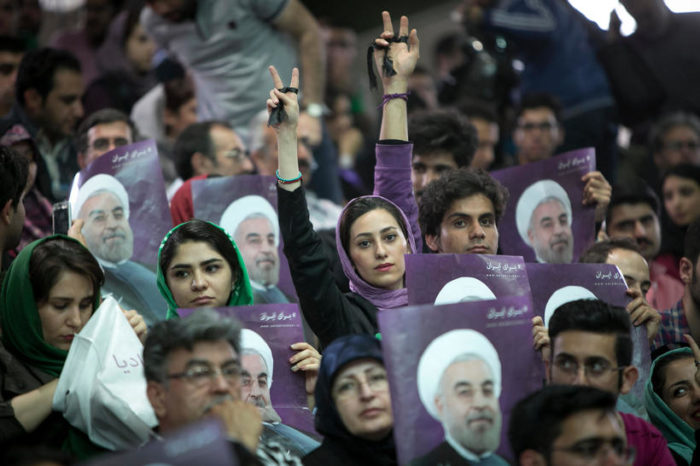Iran Counts Votes as High Turnout Encourages Rouhani Supporters

EghtesadOnline: Iran is counting votes from Friday’s presidential election after polling deadlines were extended three times amid signs of high turnout, which has historically benefited reformist candidates.
Long lines at ballot-boxes in the capital, Tehran, stretched into the evening and prompted the Interior Ministry to allow extra time for voting, which finally ended toward midnight. Press TV said that more than 38 million people, or almost 70 percent of eligible voters, had cast ballots by 10 p.m. Results are expected to start trickling in overnight, Bloomberg reported.
“If the numbers are as high as expected, then there is no way for Raisi to win,” said Alex Vatanka, a senior fellow at Middle East Institute in Washington D.C. “When Iranian voters turn out in large numbers, the reformists gain.”
Echoing recent elections around the world, the campaign centered on populist claims that ordinary people were being left behind. The race was transformed by the April entry of Raisi, whose background spurred speculation he was being groomed as an eventual successor to Iran’s ultimate arbiter, 77-year-old Ayatollah Ali Khamenei.
“This election boils down to a fundamental choice between two priorities,” said Ali Vaez, a senior Iran analyst at the International Crisis Group. “The supreme leader is paving the ground for his succession,” he said, “while a frustrated Iranian youth is seeking jobs and a move away from crisis to normalcy.”
Whoever wins will be faced with a more confrontational U.S. under Donald Trump, who has described the 2015 Iran nuclear deal as a “disaster” and imposed new punishments over the country’s missile program on the eve of balloting. Trump on Saturday travels to Iran’s chief regional foe, Saudi Arabia, where he’s expected to discuss ways to curb Iranian influence. Security and foreign policy in Iran is largely controlled by conservative agencies close to Khamenei.
Rouhani Ahead
Most opinion polls have showed Rouhani, 68, ahead of his main challengers but short of the 50 percent support he’ll need to win in a first round. But as the field narrowed and conservatives rallied behind a single candidate -- 56-year-old Raisi -- analysts saw a tight race.
A May 17 survey by the Washington, D.C.-based International Perspectives for Public Opinion Group -- whose founder correctly predicted Rouhani’s 2013 win -- did forecast a clear victory for the incumbent. It put the president on 63 percent to Raisi’s 32 percent. In previous elections, preliminary results were released within hours.
Rouhani and Raisi have very different answers to Iran’s challenges. Rouhani advocates the foreign investment promised by the nuclear deal but which has been held up by concerns over remaining punitive sanctions. Raisi and his fellow conservatives have lambasted the rule of an elite “four percent,” and said they’d expand subsidies and focus on domestic industry.
“The business community, especially the private sector, is for Rouhani’s re-election for the simple reason that we need continuity and consistency,” said Cyrus Razzaghi, president of Ara Enterprise, a Tehran-based consultancy. Executives “expect him to be bolder in terms of tax reform and trade liberalization” in a second term, he said.
Campaign Attacks
In a series of stump speeches, Rouhani attacked hardliners over their opposition to greater personal freedoms, corruption and conservative-controlled institutions that don’t pay tax.
In Jamaran, a district skirting the mountains of northern Tehran, people formed long queues waiting to vote -- all those interviewed said they were for Rouhani.
“I have stronger peace of mind and security, both socially and economically with Rouhani -- we’re not waking up in the morning to check the dollar rate every day like we used to," said 34-year-old Nastaran, a criminologist who asked to give only her first name. “You can’t fix the economy overnight or even in four years, but he’s laid the foundations and now he needs to stay on to build on that.”
Polarizing
The campaign polarized the electorate, pitting pious traditionalists who shun stronger ties with the West against a middle class that wants a less repressive society and sees foreign investment as a springboard to better jobs.
For fans of Raisi, the ideologies underpinning the Islamic Revolution are sacrosanct.
“Look at how much freedom there is now among the youth,” said Zainab, a 39-year-old housewife in southern Tehran who plans to vote for Raisi. She said she’s angry with Rouhani for backing away from Iran’s nuclear program and also criticized the way he’s handled the economy.
A Rouhani second term would allow Iran to present its “best face” and protect the nuclear deal by driving a wedge between the U.S. and other signatories, said Vaez at Crisis Group. But there’s a risk for conservative diehards that “Rouhani, who doesn’t share Ayatollah Khamenei’s vision for the future of the revolution, could influence the succession.”
Rouhani won the 2013 election vowing to end the isolation that deepened as Iran developed its nuclear program under his hardline predecessor. He’s done that -- in the process restoring oil output, spurring growth and slashing inflation. While Raisi has vowed to respect the nuclear deal, if he’s victorious on Friday, Iran will become a harder sell.
“Defeat for Rouhani would at the very least act as a brake on foreign investment and could ultimately spell the end of the nuclear agreement,” said Torbjorn Soltvedt, an analyst at global risk consultancy Verisk Maplecroft in the U.K. For companies, “the complexity of remaining U.S. sanctions, and the volatility of U.S.-Iran relations, mean that the decision whether to enter Iran at all will still not be an easy one -- even if Rouhani is re-elected.”


